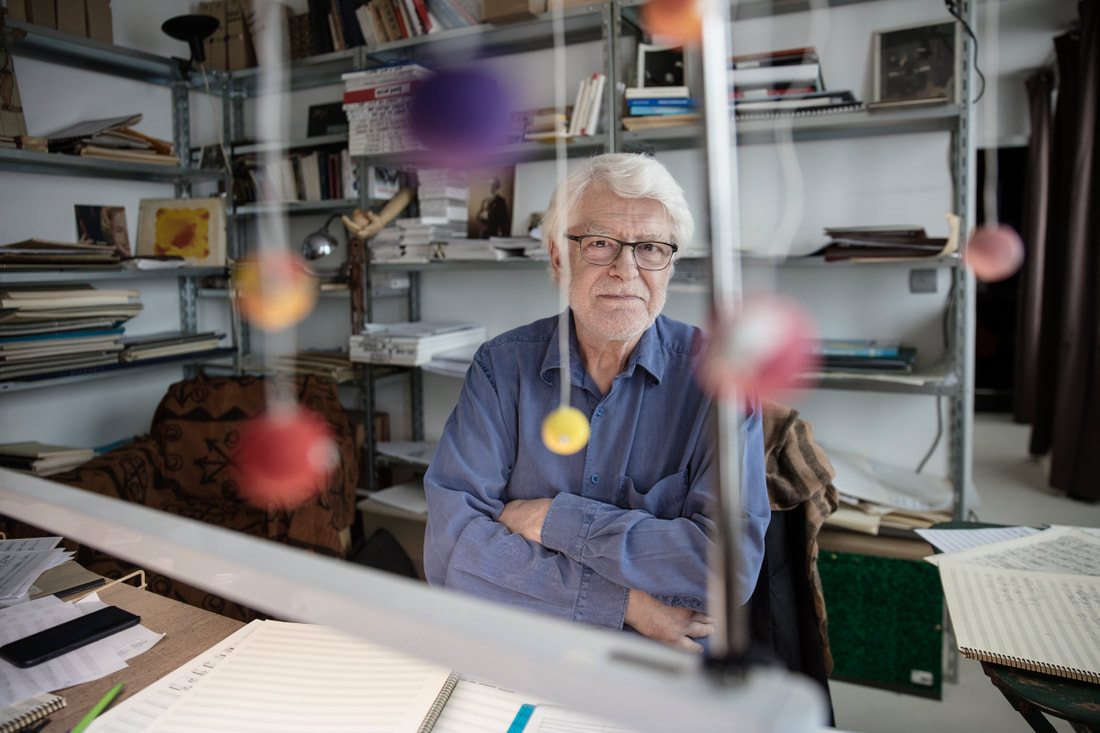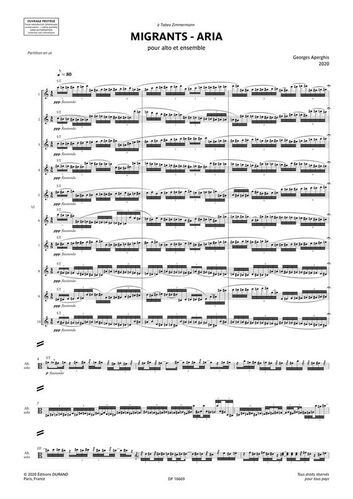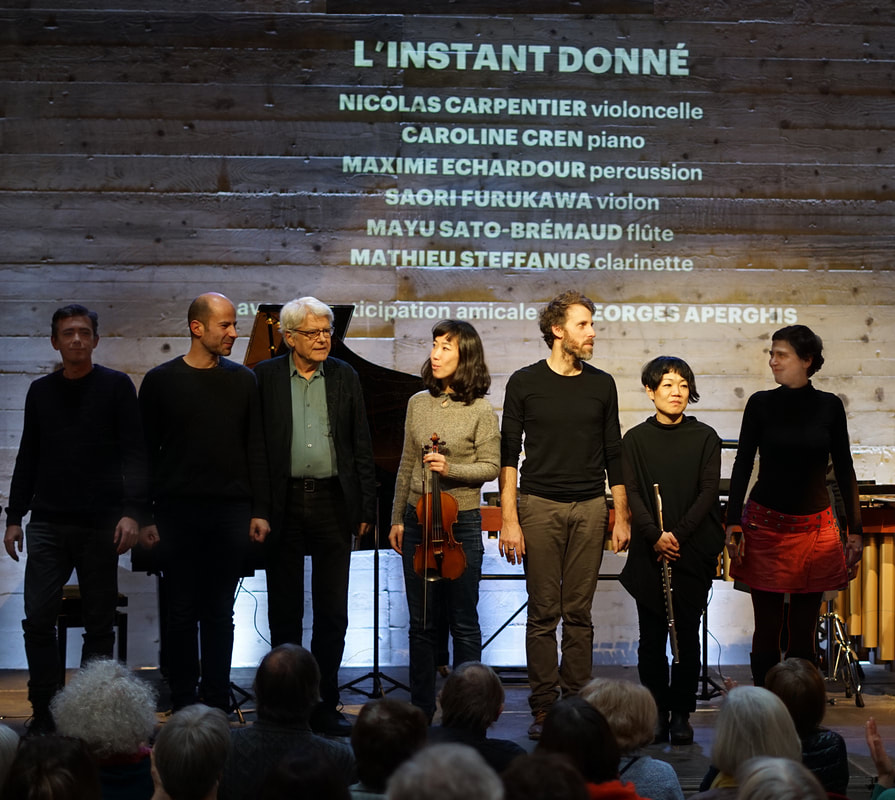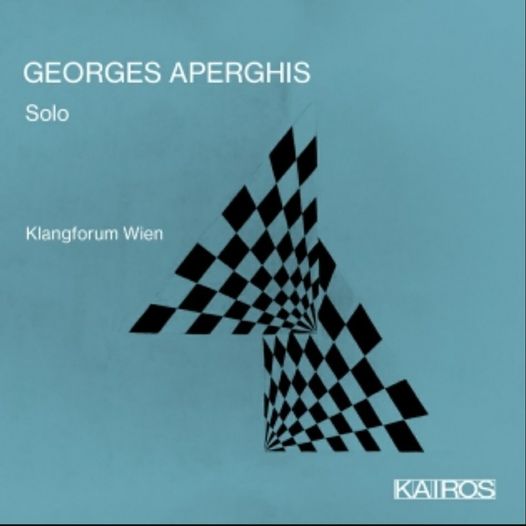The feeling of being a stranger is familiar to Georges Aperghis. "When I arrived in Paris, I was like a hair in a soup", he jokes in a conversation with the French radio journalist Anne Montaron.[2] One can still hear his Greek origins in the hardness he gives to some consonants, which stand out like short percussion strokes from the otherwise murmured stream of his speech. A murmur that often breaks abruptly into infectious laughter. Georges Aperghis himself now gives his name with the French pronunciation. From his native Athens, where he was born on 23rd December 1945, he set out for Paris in 1963, curious to learn more about the music he could only encounter in Athens via the radio. "It was a strange thing for me to do when I think about my personality. Where I got the strength from to set out, I don’t know. I left because I wanted to. I was not a refugee." Today, Aperghis can hardly imagine returning to Greece. He is at home in a foreign country and a stranger at home. The feeling of being without papers, of possibly paying for every little misstep with a loss of livelihood; he wanted it regardless. After he refused military service in the Greek army, his passport was confiscated. As a result, his residence permit also lost its validity. "If I saw a policeman coming, I immediately crossed the road and I never went through red lights!"[3] His experiences during this time, in which he earned money both as a caretaker and as a dance musician in the nightclubs of St. Denis,[4] sharpened his eye to the outsider’s perspective and created an awareness of the fragility of existence.
Today, his home is only a few steps away from the Place de la Bastille. In a busy side street, Aperghis has found his own place to live and work, among countless books, silent witnesses to his great hunger for reading, with which he has assimilated the dramas of Heiner Müller as well as the theories of Roland Barthes, the pencil territories of Robert Walser or even "polars", i.e., crime novels. Separated from the urban noise only by a non-descript door and a backyard, Georges Aperghis has his desk on a small balcony, where he carefully writes up his scores by hand on translucent paper, copying rhythmic cells and motivic figures, varying them, offsetting them. He works here every day, starting in the morning, usually without a lunchtime interruption until the evening. Since childhood, Georges Aperghis has been familiar with the separation of life and the artist’s studio; his mother was a painter, his father a sculptor. It soon became obvious that they had passed on their artistic talent, as visitors to the studio became aware of their son's drawings. At the age of nine, he had already been given his first exhibition. In retrospect, Aperghis regrets the subsequent newspaper articles - they pawed too much at his "credibility". The primary acoustic scene of Aperghis' biography as a composer is likewise in Athens: in a narrow alley of trodden earth with its everyday street theatre, accompanied by rhythmic hammering on bronze from the nearby sculptor's studio. One can vividly imagine the lone child observing these happenings on the street with curious eyes and wide-open ears, absorbing and inwardly reassembling them in new and different ways; with the sounds from the courtyards and houses combining to create an extraordinary polyphony from everyday life.
It is likely that Georges Aperghis had just lit one of his beloved cigars when he mentioned that his dream was "the impossible polyphony"[5]. A polyphony of languages, media, voices, images, and sounds. His interest in music first struck him via recordings; he quickly became disinterested in the piano lessons that his parents arranged for him and threw himself into deciphering scores. Aperghis never received classical composition lessons, but rather took Iannis Xenakis’ advice while in Paris of studying composition from scores. Likewise, he attended and absorbed the dress rehearsals of the Domaines Musicales concert series. "The first encounter with Kagel's music was like a slap in the face.”[6] A slap in the face that reinforced his curiosity to create the unknown, things he wanted to hear. His French didn’t improve dramatically in his language classes, but certainly so on the rehearsal stage, where he worked as a stage musician with directors and playwrights on great works of literature. This was also where he met his wife, the actress Edith Scob, who died on 26th June 2019.[7] Together with her, he founded his first theatre in 1976: the "Atelier Théâtre et Musique", abbreviated to ATEM. At a time when "outreach" was still an unknown concept, Aperghis worked here with the inhabitants of the banlieue, both young and old, far away from the bourgeoisie. With a small family of musicians and actors, he searched for new relations between theatre and music, sounds and bodies. His Théâtre Musical is a world of constant surprise: about what our bodies can articulate; about what things look like when they are separated from their bodies; and not least about what music represents for objects when - as in Énumerations – items such as telephone books, furniture and walls contribute to the soundtrack of a mysterious performance that could be copied from the world of work or an ancient ceremony. The Récitations, now a classic work for voice from the last decades, part inner monologue and part hysterical extroversion, owe as much to the language-play of the French Oulipo movement as they do to the releasing of the rhythmic, sonic qualities of language. They ignite a playful game between the sensical and the nonsensical, the understood and the assumed, while balancing on the narrow ledge between the understandable and the incomprehensible. Encountering the music of Georges Aperghis is like immersing oneself in another language, or as Roland Barthes described it: "The rushing mass of an unknown language [...] wraps the stranger in a cocoon of sound that makes all the alienation of one’s own mother tongue stop before his ears."[8] On condition that he was not obliged to love the resulting music, Claude Lévi-Strauss is said to have given Aperghis permission to use his epochal book Tristes Tropiques as the basis for an opera that was premiered in Strasbourg in 1996. Unlike Lévi-Strauss, however, Aperghis did not have to travel to Brazil to seek an encounter with the radically "other". In Machinations (2000), it is the world of machines and computers that become entangled with four female voices. Machinations is the first piece of music theatre in which Aperghis uses live electronics, which he has since likewise integrated into other works, as well as video. Like a painting that must always be presented within its frame, many of his works require unique technical setups that trick the observer into a supposition of simplicity: whether in Zeugen with replicated Paul Klee hand puppets or most recently in Thinking Things, in which humans and artificial intelligence chase each other with error messages. Such meshing of composition and staging, as well as the special challenges to the performers, mean that Georges Aperghis’ work is still more at home in festivals than in concert halls or repertory houses. But there is more to Georges Aperghis' oeuvre than the Théâtre Musical. In addition to his theatre work, he has written scores for ensembles and artists that he knows personally. Thus, over the decades, numerous intimate portraits have been created, not only of instruments but also of those who play them. They are cautious, tender explorations of unknown terrain, which above all have one thing in common: their vocal character. Quasi parlando, the title of a piece for double bass, is representative of this. Works that Aperghis has written for Klangforum Wien or Ensemble musikFabrik extend this concept to an entire ensemble, where a group picture emerges from 23 individual portraits: Situations is a celebration of community that places the individual at the centre. In recent years, after a previous traumatic experience in the early 1970s, Aperghis has returned to the orchestra. First with a series of etudes, then also with a concerto in which an accordion competes with a concert organ and a large orchestra. In this sense, the accordion is a stranger, an instrument that is more at home on the street, in the bars; more likely to be found at folk festivals than in the spotlight among tailcoats and evening gowns. The Other is rarely encountered as often as in the music of Georges Aperghis. And that Other always remains mysterious.
Patrick Hahn, June 2021
Translation: Robert Jacobs
[1] This and the following citations with regards to Migrants come from a discussion with Elisa Erkelenz as printed in the program booklet for its premiere by Ensemble Resonanz in Hamburg.
[2] GeoRges Aperghis, "Mes années d’école, c’était la pire période de ma vie, j’étais angoissé" (1/5), in: Les grands entretiens, Lundi, 4 juin 2018, accessed on 4 June 2021, https://www.francemusique.fr/emissions/les-grands-entretiens/georges-aperghis-compositeur-1-5-61797.
[3] Unless marked otherwise, the citations come from conversations that the author has had with Georges Aperghis since 2007.
[4] The nightclub ‚Le rêve‘, which used to be housed in the most popular cinema of the city (‚Rex‘) was a notorious location and famous for its pre-show waterfalls.
[5] „la polyphonie impossible“.
[6] Georges Aperghis, "Mes années d’école, c’était la pire période de ma vie, j’étais angoissé" (1/5), in: Les grands entretiens, Lundi, 4 juin 2018,accessed on 4 June 2021, https://www.francemusique.fr/emissions/les-grands-entretiens/georges-aperghis-compositeur-1-5-61797.
[7] They have two sons together, Alexandre und Jérôme, who are both screenwriters. „They are still playing together, just as they did as children. Through they playfulness, they have prevented me becoming too serious and thus I still consider composition to be a form of game. Children are just so important.“
[8] Roland Barthes (1981). Das Reich der Zeichen, Frankfurt am Main, p.22.



